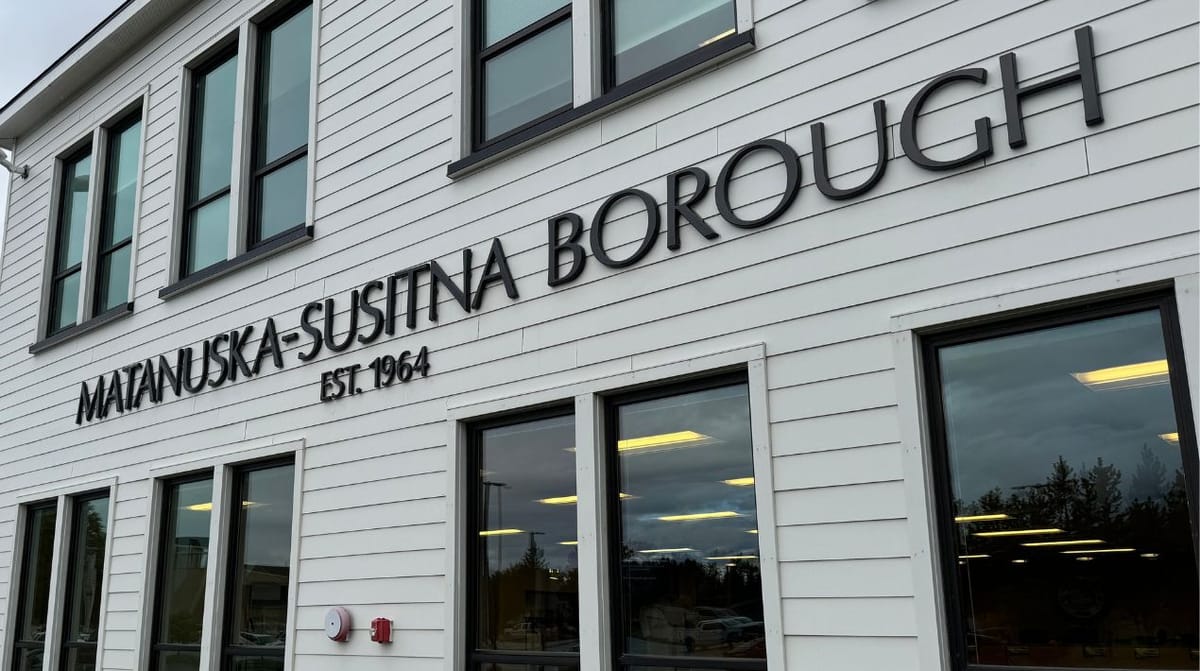Mat-Su Assembly to consider ballot counting machine ban, Assembly residency rules update
The proposals would prohibit the use of paper-counting machines on Election Day and remove a resignation requirement for some Assembly members who move out of their districts.

What you need to know:
- The Matanuska-Susitna Borough Assembly will consider a series of election law updates, including a proposal that would prohibit the use of paper-counting machines during ballot counting and a rule that would allow any Assembly member who moves out of their district but remains in the borough to stay in their seat for the remainder of their term.
- Paper-counting machines are currently used alongside the borough’s ballot hand-count process to guard against human error. Under current borough law, any Assembly member who moves out of their district is required to resign before the next general election.
- The proposals aim to address a series of issues flagged by the borough clerk, attorney, Assembly members, and residents during the 2024 election cycle. The proposals will be considered
PALMER – The Matanuska-Susitna Borough Assembly will consider a resolution prohibiting election officials from using paper-counting machines to help tally ballots on Election Day.
A second proposed update would allow Assembly members to keep their seats if they move out of their districts but remain in the borough.
The Assembly will consider the proposals at a meeting Tuesday. The updates also include a series of technical changes to borough election law.
The measures do not require voter approval.
The proposals address issues flagged by the borough clerk, attorney, assembly members and citizens during the 2024 election cycle, Assembly member Dmitri Fonov said in an interview.
The resolution blocking paper-counting machines would add to a rule passed by the assembly in 2022 that prohibits the use of voting tabulation machines and requires election officials to tally all borough votes by hand. It is co-sponsored by Fonov, whose district includes sections of Palmer and Wasilla, and Assembly member Ron Bernier, whose district includes Talkeetna.
Mat-Su Sentinel thanks its sponsors. Become one.
The borough’s paper counting machines are meant to guard against human error by tallying the total number of ballots submitted, Borough Clerk Lonnie McKechnie said in an interview last year. They do not tabulate votes, she said. The machine tally is double-checked by an election official before hand counting begins, she said.
The 2022 hand count law did not address paper-counting machines.
The newly proposed resolution would update the borough election rules to prohibit paper counters. It would also direct the clerk to propose a pay raise for election officials. Higher pay could help the borough recruit more individuals to process ballots, allowing them to double-check their counts with another person instead of against a machine, Fonov said.
Sign up for Mat-Su Sentinel
Get stories like this one straight to your inbox.
No spam, we promise. Unsubscribe anytime.
“That’s how we prevent additional mistakes, because we’ll have more people to count,” he said.
Under borough law, election workers are paid between $200 and $450 for Election Day, depending on the role.
The paper counting machines also created delays and confusion in the hours after polls closed in November because they were unable to efficiently process the large number of ballots submitted through during record voter turnout, Fonov said. Eliminating the machines and relying only on human workers would resolve that issue, he said.
Some citizens who testified during public comment at a November assembly meeting certifying the election said using any machine during the tally, including a paper counter, violates what they view as the intent of the borough 2022 hand-count law. They said that law was meant to fully remove all counting machines from the election process.
A 2022 borough resolution regarding the hand count said the change was in response to public concern about voting machine security.
The assembly on Tuesday will also consider an ordinance updating residency rules for assembly members who move out of the borough or their district before the end of their terms. The measure is co-sponsored by Fonov and Assembly member Dee McKee, whose district includes portions of Palmer and Wasilla.
Borough code requires any Assembly member who moves out of the district they represent to resign before the next regularly scheduled general election. It does not specifically address what happens when a member moves out of the borough entirely.

The update would add a rule requiring any Assembly member who moves out of the borough to forfeit their seat immediately. It would also clarify that any member who moves out of their district but remains in the borough can serve out the remainder of their term. An Assembly member whose address changes due to redistricting would also be allowed to continue serving under the proposed change, Fonov said.
The residency update was inspired by the September resignation of former Assembly member Rob Yundt, according to a memo included with the proposal. Borough law required Yundt to vacate his seat because he moved to a home in a bordering district. Yundt said he did not know about the residency rule when he decided to move.
The assembly selected Maxwell Sumner to fill the empty seat until November, when it must go before voters, according to borough law. The seat must also appear on the ballot in 2026 when its regular term expires.
Fonov said elections triggered by resignations like Yundt’s can be costly for candidates and the borough. Avoiding them would help borough officials in an ongoing effort to align term lengths with existing state and federal election dates as a means of avoiding low voter turnout, off-cycle elections entirely, he said.
Updates to Mat-Su borough code approved last year extended term lengths for Assembly members and the borough mayor from three to four years as part of that change. The measure did not require voter approval.
School board terms, which are set by state statute, remain at three years and require off-cycle elections. Borough officials have requested state lawmakers change that rule to allow local control over school board term lengths.
A series of other election-related changes in the proposed ordinances include technical updates to align the borough code with existing Alaska state law, a measure allowing election officials to begin counting early voting ballots before polls close on Election Day and an increase to the word limit used for candidate statements in the borough election pamphlet.
Public hearings on the ordinances will be held during the Assembly meeting Tuesday. Members of the public may also speak about the resolution, ordinances or any other topic during one of two public comment periods at the meeting.
-- Contact Amy Bushatz at abushatz@matsusentinel.com
